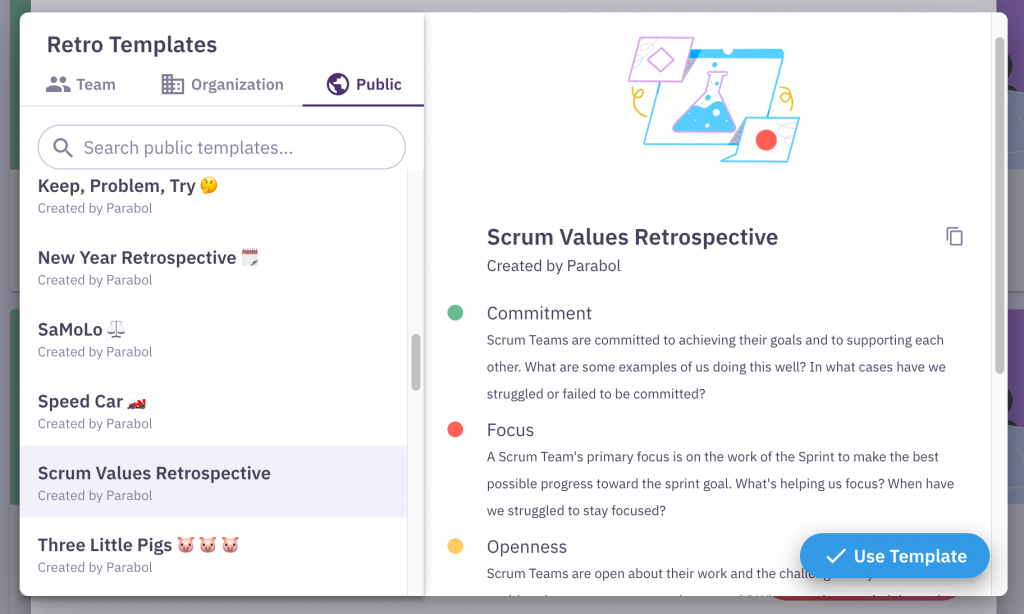Scrum Values Retrospective
Work with commitment, focus, openness, respect, and courage

What is a Scrum Values retrospective?
We all know the Scrum values – commitment, focus, openness, respect, and courage. The Scrum values help teams keep up with challenging, complex projects that are always changing, and support each other while we’re at it. In short, they help us do our best work on Scrum teams without losing our minds.
But is your team actually putting the Scrum values into practice?
No matter how dedicated your team is to Scrum , sometimes it’s good to check in. When you come to work every day, are you walking the agile walk?
Unlike the three Scrum pillars of transparency, adaption, and inspection, the Scrum values are specific and behavioral. That makes them perfect to examine with a sprint retrospective!
This retro uses each value as a prompt. The scrum master will help your team evaluate whether the values are present, and if so, how they’re showing up.
Commitment
What commitments is your team great at upholding? Are there any kind of commitments that at times, felt harder to uphold or out of reach?
Scrum Teams take their work seriously, committing to achieving their goals and supporting each other. That includes short-term sprint goals, and longer-term product goals. It means upholding an agreed-on quality of work and supporting others in doing so, too.
Example: I think we’re great at commiting to the sprint goal. It always comes first.. Because of this, stakeholders know they can trust us, and that’s a great feeling.
Focus
On your team, are there topics or tasks that just flow – or areas where you tend to get more distracted? What external factors either help you focus, or sometimes throw you off track?
When everyone’s attention and energy is focused on your Sprint and its goals, you know you’re making the best possible progress. As a team, you’re working optimally, even if challenges and setbacks come up.
Example: I think Lily, our product owner, is a great example of focus. It’s amazing how detail-oriented she is, while never losing sight of the big picture.
Openness
In what areas do you excel at being real with each other – and is there anything you tend to keep bottled up? What practices help you maintain a culture of openness?
Openness means everyone on the Scrum Team openly shares their knowledge and knows what the latest progress is. That includes transparency about any problems or challenges you might run into.
Example: I think we could get better at being more open about it when we’re frustrated. Last week, I saw Jia’s LinkedIn post about an undesirable situation at work, which I recognized. If she’d been open about it, I could have helped her fix it at the time.
Respect
What practices help you maintain a strong and trustful culture of respect? What stumbling blocks have gotten in the way of that before?
Scrum team members trust one another to be capable, independent, and trustworthy people.
When we know our team members respect our abilities, it builds psychological safety. We can focus on the task at hand and take risks when we need to, without worrying about our teammates’ opinion of us.
Example: I think we’re great at respecting each others’ time. When someone adds timeboxes to the calendar, we never come to them for help or ask them to change their schedule.
Courage
When have you been proud of your agile team’s courageous actions? Are there any times you struggled to do the right thing – or were unsure if it was even possible?
Scrum teams have the courage to do the right thing, even in the face of complex problems.
Complicated projects can feel daunting, ambiguous, and require you to learn and stretch your skills on the fly. That’s a good thing – as long as you’re armed with the courage to dive in anyway.
Example: I think our team is great at making tough and unpopular decisions if we need to – like spending a sprint refactoring some code. We don’t worry that it might look bad if we need to take on unpopular tasks from the product backlog.
When to do a Scrum Values retrospective
When getting started with Scrum
This is the perfect retrospective format if your team is newly formed, or even just new to the Scrum framework.
You probably already know the Scrum values. But thinking about how they play out in practice will help you understand them so much more deeply.
You can also put this retrospective to use in connection with a Team Charter process.
To get back in touch with the Scrum values
This is a great template if your team feels like you’re getting off track, but isn’t sure why.
Why not start with this sprint retrospective, and evaluate whether your work habits were aligned with the scrum values? More commitment, openness, focus, respect, and courage will always help you work better.
During agile transformations
The Scrum values retrospective is a good companion for facilitators, agile coaches or scrum masters helping teams through an agile transformation.
Not only does it help teach the Scrum values, but it can help teams understand how and when they practice them. It’s a good opportunity for Scrum team members to assess how mature they are in practicing the Scrum values.
How to run a Scrum Values retrospective in Parabol
Facilitators can start this meeting in Parabol by selecting their team on the right and then hitting that vibrant Add New Meeting button.
Select the Scrum Values retrospective template
Jump into Parabol and select Retro Meeting with the arrows, then use the dropdown to select the Scrum Values retrospective template. This is where you’ll find Parabol’s library of 40+ pre-made and customizable retrospective formats.

Every Parabol retrospective begins with an optional icebreaker. This box is checked by default. You don’t have to do one, but we recommend it – especially for remote teams.
Start your retrospective with an Icebreaker
If you’re doing an icebreaker, you’ll have a random question to answer. You can refresh it if you want another option, and of course you can create your own if you want.

Reflect on your last sprint with the Scrum Values retro prompts!
After the icebreaker you’ll move on to the reflect stage. This is where your team will do all their ideation and brainstorm in silence using the prompts above. All reflections are kept anonymous at this stage to prevent groupthink.
All Parabol sprint retrospectives can be run synchronously or asynchronously. Functionalities such as the timer, voting and multiplayer grouping help you make your retrospective exercise a success and make facilitation easier.
Discuss and set action items for continuous improvement
Team members can all leave comments together on topics you’ve chosen. Parabol has a discussion thread just for that!
After the reflect phase, you’ll group reflections into topics, vote on issues to discuss, talk about the most voted on items, and set action items for each process improvement so you can make it a reality.
Parabol will send a summary of the retro when you’re done so nobody needs to take notes. You can also send any action items out to Jira or GitHub where your tasks belong!
If you like this template, you might also like other team-building activities, including the Team Charter template, Hands on Deck activity, the Dream Team retrospective, or the Superhero retrospective.